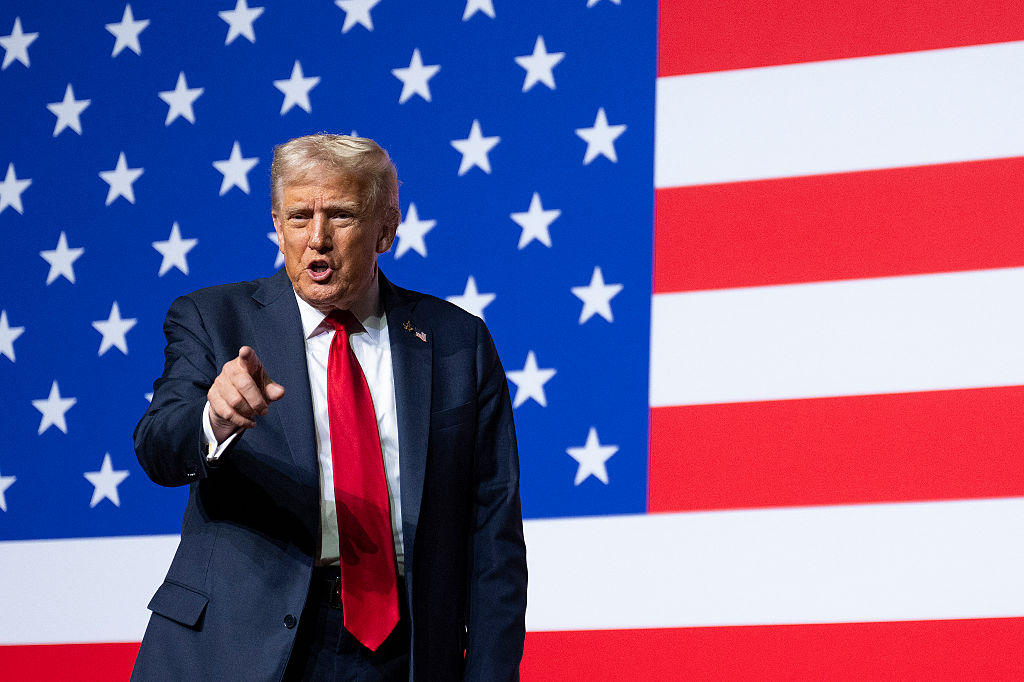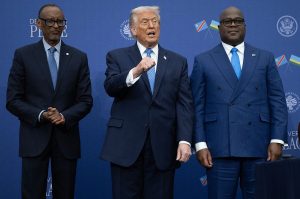With typical assertiveness, Defense Secretary Pete Hegseth gave his marching orders to the US military at the end of September. No more “fat troops” or “fat generals and admirals in the halls of the Pentagon.” No more woke. Make War Great Again.
At the same time, with typical modesty, Donald Trump said of his proposed peace deal between Israel and Gaza, “This is a big, big day, a beautiful day, potentially one of the greatest days ever in civilization.” No more starvation, no more senseless death. Make Peace Great Again.
In Trumpworld, these two agendas are not contradictory. A strong army at home guarentees peace abroad – or that’s the hope, anyway. But what happens when America’s enemies don’t play ball?
Hamas – or what remains of it – has yet to respond to the President’s announcements. If Trump really can end the killing and return Gaza to some sort of peace, it will be an achievement of which he can be proud – and which everyone else can welcome with relief.
But there is a very big “if” there. It is not obvious why a terror organization which has been waging war against the very existence of Israel for years, and which has shown its zealotry over and over again, should want to accede to a deal which does not appear to offer it very much. Hamas fighters and officials would be allowed to leave Gaza or even to continue to live there, providing they do so peacefully, with some degree of immunity. A thousand Palestinian prisoners would be released by Israel in return for the remaining living Israeli hostages held in Gaza.
But there is no offer of Palestinian statehood, however much that would please Britain, France and other countries which have recently made a show of recognizing it as a nation. Trump has not talked of the deal’s leading to a Palestinian state, and Benjamin Netanyahu has been adamant that it is not part of the deal and will never happen.
Trump’s claim to greatness is built onthe pretext that he can cut deals which no other US president could
The best that can be said about it from Hamas’s perspective is that, in contrast to an earlier proposal from the President, the deal would not require Palestianians to leave the Gaza Strip for ten years before – supposedly – being allowed back to a land which would by then have been transformed by western property developers. Neither, as per the video reposted by the President, would Gaza be transformed into a ghastly Trump resort. But Trump would be the ultimate governor of the place, aided by other figures including Jared Kushner and former British prime minister Tony Blair. Only at some point in the future would Gaza be entrusted to the Palestinian Authority, whose current territory is restricted to the West Bank.
If Hamas does accept the deal, it will be because the Israel Defense Forces have degraded the group to the point at which the zealots are no longer quite so much in charge. Then again, even those who remain may well choose death over what would amount to surrender. If the deal is rejected and the war recommences it would be a tragedy for the Gazans. But that’s the all-too-likely scenario.
Trump’s claim to greatness is built on the pretext that he can cut deals which no other US president could. His methods might be unconventional, alarming even. But at the end of the process he can shake hands and achieve things which would have eluded more earnest and straightforward leaders. In his first term, he lived up to this image. In contrast to Barack Obama, Trump realized that the way to deal with Kim Jong-un was to flatter him. Where other presidents would have shunned the North Korean leader, Trump went to meet him and appeared to succeed in containing his expansionist ambitions, at least for a while.
There was success, too, in persuading Bahrain and the United Arab Emirates to recognize Israel. It promised a new era of relations between Israel and the Arab nations, which no other president had achieved – and few saw coming under Trump.
In Trump’s second term, however, his foreign-policy magic seems to have deserted him, even if he does boast about “ending seven un-endable wars.” He misjudged his ability to talk Vladimir Putin into a ceasefire in Ukraine, with the fundamentally untrustworthy Russian President treating his overtures with contempt. Trump, who famously told President Volodymyr Zelensky that he had “no cards to play,” has since performed a backflip and told Ukraine to keep fighting.
If Trump were to fail in Gaza, too, he could well retreat from the global stage and immerse himself entirely in domestic politics. His fantasy of winning the Nobel Peace Prize would be over – if it was ever a remote possibility given its long history as an award given by the liberal establishment to the liberal establishment. Success, on the other hand, would vindicate Trump’s way of doing things while showing the error of formally recognizing a Palestinian state. What has that achieved? Nothing, other than to give Hamas an opportunity to claim success.
The world is a messy place. Trump realizes that if you want to do a deal to end a war you have to appeal to both sides. That seems to have been lost on other world leaders.
Whatever Hamas’s response to Trump’s peace deal, there remain intractable problems. Many in Israel, such as Netanyahu, are dead set against there ever being a Palestinian state. Israeli settlement of the West Bank over many decades and under many governments has brazenly attempted to render this impossible by pockmarking it with areas occupied by Israelis. Tensions and grievances will remain.
But if Hamas accepts the deal, at least the brutality of the past couple of years will be over. On this, even Trump’s many enemies should want him to succeed.
This article was originally published in The Spectator’s October 13, 2025 World edition.


























Leave a Reply